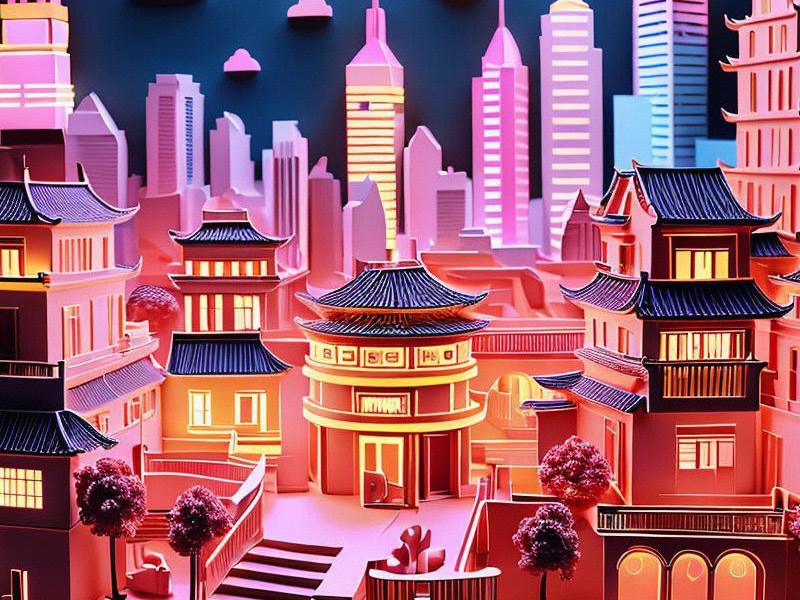This article delves into the vibrant and evolving entertainment club scene in Shanghai, exploring its impact on the city's nightlife, cultural renaissance, and urban lifestyle. It examines the historical context, current trends, and future prospects of Shanghai's entertainment clubs.

Shanghai, a city that has long been synonymous with modernity and cosmopolitanism, has seen a remarkable transformation in its entertainment landscape. Once characterized by traditional tea houses and teahouses, the city is now a hub for cutting-edge entertainment clubs that cater to a diverse and dynamic population. This renaissance of nightlife in Shanghai is not just a reflection of the city's economic prosperity but also a testament to its cultural evolution and the aspirations of its residents.
The history of entertainment in Shanghai dates back to the late 19th and early 20th centuries when the city was known as the "Paris of the East." During this period, Shanghai's International Settlement became a melting pot of cultures, attracting expatriates from around the world. The city's nightlife flourished with the establishment of cabarets, dance halls, and jazz clubs, which became iconic symbols of the era. Icons like the Paramount Ballroom and the Canidrome Stadium were the epicenters of entertainment, drawing crowds with their glamorous performances and lively atmospheres.
However, the political upheavals of the mid-20th century brought an end to this golden age of Shanghai's nightlife. The Cultural Revolution and subsequent decades of economic stagnation saw the decline of the entertainment industry. It wasn't until the late 1980s and early 1990s, with the opening up of China and the rapid economic development of Shanghai, that the city began to experience a resurgence in its entertainment scene.
Today, Shanghai's entertainment clubs are a far cry from their predecessors. They have evolved into sophisticated venues that offer a wide range of experiences, from high-energy DJs and live music performances to art exhibitions and culinary delights. These clubs are not just places to party; they are cultural hubs that reflect the city's dynamic and inclusive spirit.
爱上海最新论坛
One of the most notable trends in Shanghai's entertainment clubs is the integration of technology. With the advent of smart devices and social media, clubs have embraced digital innovation to enhance the guest experience. From mobile apps that allow users to book tables and order drinks to interactive light shows and virtual reality experiences, technology has become an integral part of the nightlife scene. This fusion of tradition and technology has created a unique and immersive environment that appeals to both locals and tourists.
Another significant trend is the rise of themed clubs. These venues offer a curated experience that goes beyond just music and dancing. For instance, some clubs are designed to transport guests to different eras or cultures, complete with elaborate decor, costumes, and themed events. Others focus on specific interests such as art, fashion, or sports, creating a niche community for like-minded individuals. This trend reflects the growing demand for personalized and authentic experiences in today's nightlife market.
The impact of Shanghai's entertainment clubs extends beyond the city's borders. They have become a symbol of China's rising global influence and a showcase of the country's cultural soft power. International artists, DJs, and performers frequently visit Shanghai to perform at these clubs, contributing to the city's reputation as a global entertainment capital. At the same time, Shanghai's clubs are also a source of inspiration for other cities in China, driving the development of the nightlife industry across the country.
上海龙凤419是哪里的
However, the rapid growth of Shanghai's entertainment clubs has also brought about challenges. One of the main concerns is the impact on the surrounding communities. The noise, traffic congestion, and safety issues associated with nightlife can sometimes lead to conflicts between club-goers and local residents. To address these concerns, the city government has implemented various measures to regulate the entertainment industry. These include stricter licensing requirements, noise control regulations, and enhanced security measures.
Another challenge is the sustainability of the industry. As competition intensifies, clubs must不断创新 (innovate) 不断创新 (innovate) continuously innovate to stay relevant and attract customers. This includes investing in state-of-the-art technology, offering unique experiences, and fostering a strong brand identity. Additionally, clubs must also navigate the complexities of the Chinese regulatory environment, which can be unpredictable and subject to change.
Despite these challenges, the future of Shanghai's entertainment clubs looks promising. The city's continued economic growth and urbanization are expected to drive demand for nightlife experiences. At the same time, the increasing popularity of experiential consumption and the growing middle class in China are likely to further fuel the growth of the entertainment industry.
上海贵人论坛
In conclusion, Shanghai's entertainment clubs represent a new chapter in the city's history, marking a renaissance of nightlife that is both a reflection of its past and a vision for its future. They are not just places to party; they are cultural landmarks that embody the spirit of Shanghai and its residents. As the city continues to evolve, so too will its entertainment scene, offering endless possibilities for innovation and creativity.
The story of Shanghai's entertainment clubs is a testament to the city's resilience and adaptability. From the glamour of the International Settlement to the digital age of today, Shanghai has always been at the forefront of cultural trends. Its entertainment clubs are a vibrant expression of this legacy, blending tradition with modernity to crteeaa unique and unforgettable experience for all who visit.
As we look ahead, it is clear that Shanghai's entertainment clubs will continue to play a pivotal role in shaping the city's identity and attracting visitors from around the world. They are not just a part of Shanghai's nightlife; they are a symbol of the city's enduring魅力 (charm) 魅力 (charm) charm and its commitment to being a global hub for culture, commerce, and creativity.